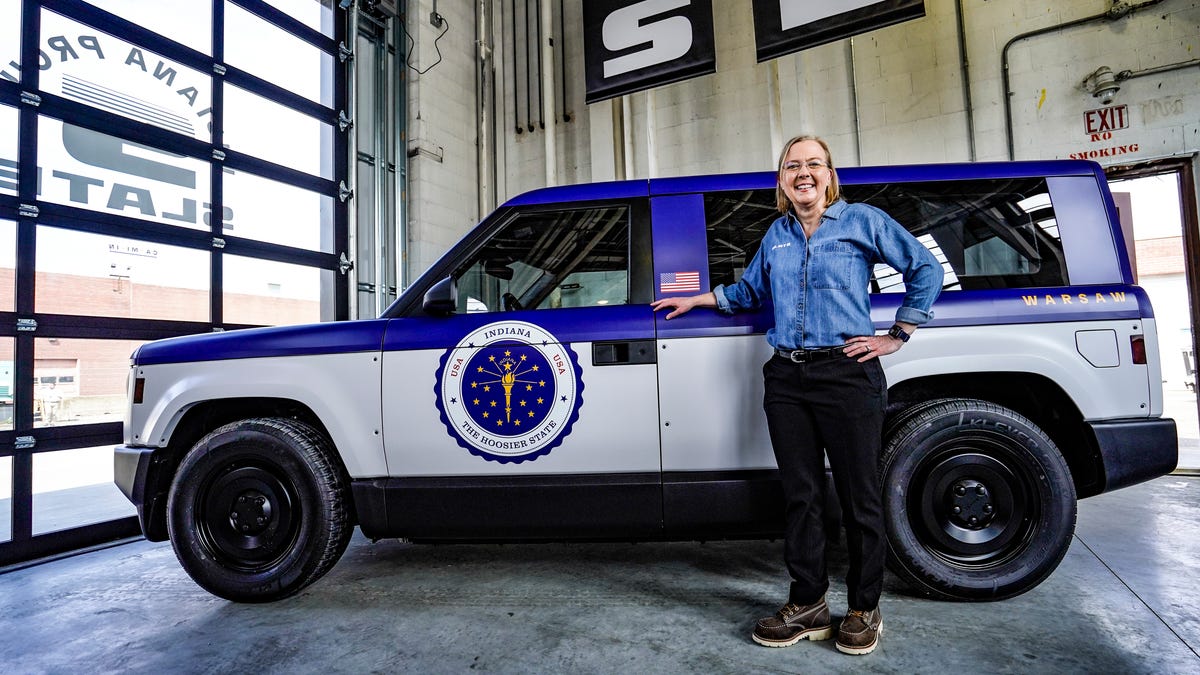WARSAW — As a fresh high school graduate in Northern Indiana, Don Stoneburner, 68, remembers the first time he stepped foot in the R. R. Donnelley and Sons printing plant just outside Warsaw, Indiana, in 1975. The plant, known for printing JC Penney catalogs, employed more than 1,800 people at its peak and printed 18 million magazines, he remembers.
But the plant, acquired by LSC Communications in 2016, shuttered in 2023, leaving a shell of a bustling economic engine behind and more than 500 people out of work. Soon, however, new machines will be whirring at the plant, as Slate Auto, an EV startup causing a storm in the auto industry takes over the space.
“This place is not done yet,” said Stoneburner, who is now a senior electrical engineer of manufacturing and quality at Slate.
Founded in Michigan in 2022, Slate has turned heads by drawing big-name investors, notably Amazon billionaire Jeff Bezos, and employees with rich automotive expertise, including chief executive Chris Barman, who formerly worked as a Chrysler vice president. The brand’s base model, without a radio or automatic windows, offers a no-frills option not common in modern cars.
Slate moved into its new 1.4 million-sqaure-foot factory home in Kosciusko County, just outside the Warsaw city limits and about 120 miles north of Indianapolis, earlier this year. Work is underway to convert the old printing plant into an automotive factory and establish the company’s presence near the city of 80,000.
The factory will create more than 2,000 jobs, Slate said. Slate expects to hire many employees from Kosciusko County and surrounding Indiana towns, some of whom worked at the factory during its former life, like Stoneburner. Many other employees, Barman said, will pick up and move to Warsaw, where city and county officials are taking steps to develop more real estate into housing.
Several of the roughly 450 employees Slate has hired so far used to live in Indiana before moving outside the state to pursue other jobs in the automotive industry, Barman said.
“They had wanted to move home, but didn’t have the opportunity until now,” Barman said.
There’s still a hefty load of work to complete before the factory is up and running, but Slate officials predict cars will roll out of the factory by the end of 2026. More than 100,000 reservations requiring a $50 deposit have been made for vehicles, Slate says.
The young automaker hopes to turn the electric vehicle industry on its head, with the affordability of their product: a bare bones truck that can be outfitted any way the buyer pleases but only after the car exits the factory line.
“There are no factory options,” Barman said. “It’s back to the basics.”
Price has been a sticking point for many car buyers who are hesitant to turn to EVs, as they typically cost more than their gas-guzzling counterparts. Other EV makers have struggled to get vehicle prices down, including Tesla, which dominates the American EV market.
But prices could become more competitive after President Donald Trump slashed EV tax credits earlier this year. In the spring, Slate advertised a truck that would cost less than $20,000 thanks to a $7,500 federal tax credit for new cars. Now, company executives say the vehicle price will start in the mid-$20,000s.
Still, for the buyer who wants a one-of-a-kind ride, Slate plans to clear the competition, with more than a million customizations offered after the gray truck exits the factory. Customers can browse different design options online.
At the Warsaw factory, Slate showed off two vehicles in a makeshift showroom that will later become a customer center reminiscent of a car dealership lobby. One was the original naked gray truck. Another had been transitioned to an SUV model with the Indiana state flag emblazoned on the side and “WARSAW” stamped onto the trunk.
With the opening of the Warsaw factory, Slate will add its name to a long list of automakers who have built cars in Indiana. By the end of 2027, Slate hopes to build 150,000 vehicles a year at the plant.
The company also stands to benefit from those who want to buy American-made vehicles at a time when the Trump administration’s tariffs are swirling the economy and threatening auto manufacturers who source parts or build outside the United States.
During the Aug. 28 tour of the factory, U.S. Rep. Rudy Yakym, who represents Warsaw and other northern cities like South Bend, lauded Trump’s signature One Big Beautiful Bill Act, passed earlier this summer after Slate announced its factory location.
“Slate has proved that when we keep Made in America provisions strong, companies step up and they build right here at home,” Yakym said.
Alysa Guffey writes business, health and development stories for IndyStar. Have a story tip? Contact her at amguffey@gannett.com or on X: @AlysaGuffeyNews.











